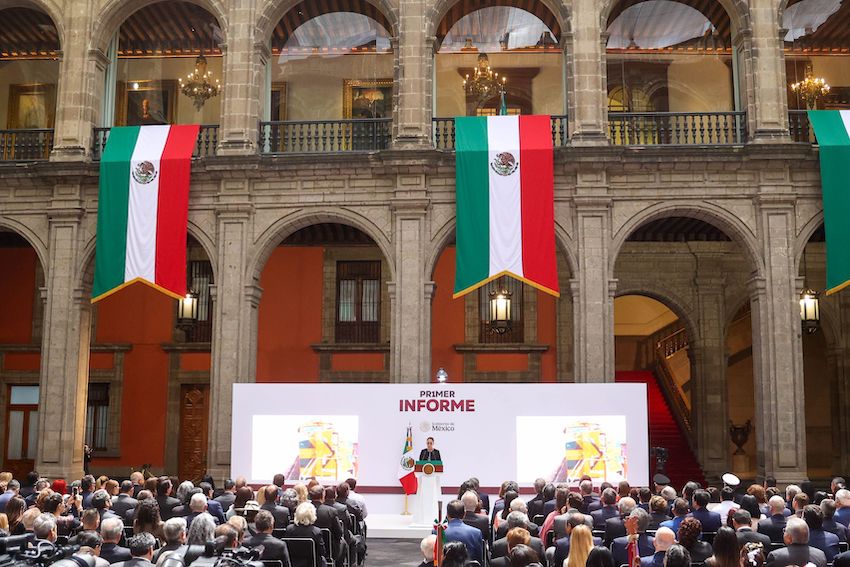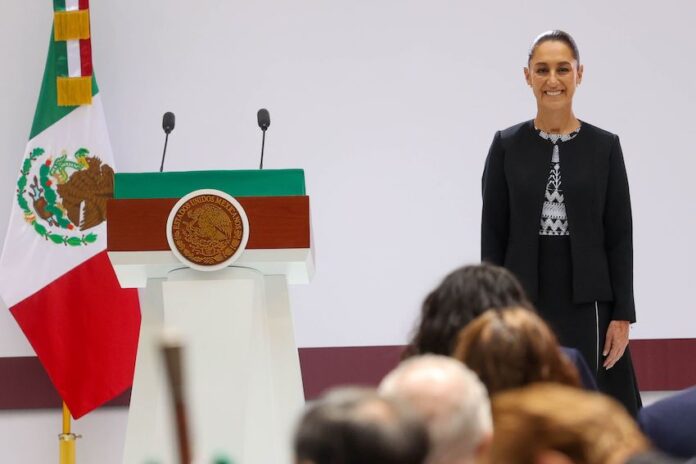Exactly 11 months after she was sworn in as Mexico’s first female leader, President Claudia Sheinbaum on Monday delivered her first annual government report in a 70-minute speech, an upbeat address that focused on achievements in a range of areas, including security, the economy and health care.
“We’re doing well and we’re going to do even better,” Sheinbaum said near the end of her address, delivered at the National Palace in the historic center of Mexico City to an audience that included high-ranking federal and state officials as well as leaders in Mexico’s business community.
The president gave a nod to her predecessor and political mentor early in her speech, noting that more than 13 million Mexicans exited poverty between 2018 and 2024, a period that coincided with the presidency of Andrés Manuel López Obrador (AMLO).
She made it clear that governing for women and improving their lives is a priority for her administration, and declared that she didn’t ascend to the presidency on her own, but rather “all” women and girls arrived at Mexico’s top job last October.
Sheinbaum, the leader of the “Fourth Transformation” (4T) political movement initiated by López Obrador, also asserted that the transformation is “not just continuing,” but “deepening” as well.
Before moving into the meat of her speech, she said she was at the National Palace not to offer “empty words” to the nation, but to enumerate the “results” her government has achieved in the past 11 months and which are “reflected in the daily lives of millions of Mexicans.”
Sheinbaum nears the completion of her first year in office with an approval rating above 70%, making her the most popular president at this stage of her incumbency in decades.
However, she is certainly not without her critics, facing claims as serious as that she is turning Mexico into a more authoritarian, less democratic nation — assertions that she unsurprisingly rejects.

Looming across Mexico’s 3,145-kilometer-long border with the United States is President Donald Trump, who, since returning to power in January, has pressured the Sheinbaum administration to do more to combat cartels and the drugs they traffic, and significantly undermined the USMCA free trade pact by imposing tariffs on a range of imports from Mexico, including motor vehicles.
Part of Sheinbaum’s popularity can be attributed to the way she has calmly and confidently dealt with — and won concessions from — an unpredictable and protectionist U.S. president, leading various media outlets to describe the 63-year-old former Mexico City mayor as a “Trump whisperer.”
Security
“In 11 months we’ve reduced homicides by 25%.”
One of Sheinbaum’s greatest challenges is to reduce violence in Mexico, where homicides reached an all-time high during AMLO’s six-year term.
Near the end of her address on Monday morning, the president highlighted that her government has implemented a new security strategy and sought to underscore her administration’s commitment to pacifying Mexico by noting that her security cabinet meets daily at 6 a.m. to “assess and strengthen” that strategy.
In an assertion of Mexican sovereignty amid the ongoing pressure her government faces from its U.S. counterpart, Sheinbaum stressed that her administration’s “policy for the construction of peace” is decided in Mexico without any outside influence.
She went on to highlight that murder numbers in July were 25% lower than in September 2024, the last month of AMLO’s presidency.
“In other words, 22 fewer homicides were committed in July than in September 2024,” Sheinbaum said, without mentioning that the annual decline in murders in the first seven months of 2025 was a more modest, but still positive, 15.9%.
Sheinbaum said that even more “significant” reductions in homicides have been achieved in some of Mexico’s most violent states, including Zacatecas and Guanajuato. She avoided speaking about the sharp increase in violence in Sinaloa, where rival factions of the Sinaloa Cartel have been engaged in a full-blown war since the second half of 2024.
Among other security-related remarks, Sheinbaum noted that her government launched an anti-extortion strategy and reiterated that her government is committed to “zero impunity.”
“I’m certain that the new judiciary will help a lot in this process,” she said.
The economy
“We’re consolidating a new economic model that guarantees macroeconomic stability, but promotes shared prosperity.”
Sheinbaum said that the “dark, neoliberal night” in which previous governments only looked out for the interests of the top end of town was left in the past when López Obrador came to power in 2018.
Mexico’s GDP expands 0.6% quarter-over-quarter in Q2, slightly below estimates
She railed against past “neoliberal” governments for not seeking to redistribute wealth or play a significant role in the development of the economy and the nation.
“The experience of those decades showed that this idea was completely mistaken: without an active role of the state oriented towards social justice, the concentration of wealth only deepens inequality and leaves millions in poverty,” Sheinbaum said.
“… Fortunately, we’re consolidating a new economic model that guarantees macroeconomic stability, but promotes shared prosperity with fair salaries and welfare programs,” she said.
The president touted her government’s commitment to “honesty and republican austerity” and ran through a range of economic data as she sought to demonstrate the strength of the Mexican economy. She highlighted that:
- The Mexican economy is expected to grow 1.2% this year, despite the “catastrophic” forecasts of “international financial organizations.”
- Foreign direct investment hit a record high in the first half of 2025.
- The Mexican peso remains below 19 to the US dollar.
- The unemployment rate is 2.7% — “one of the lowest levels in the world.”
- The annual inflation rate was 3.5% in July.
- The minimum wage increased 12% at the start of 2025.
- Tax collection increased 8.5% annually in the first eight months of 2025.
‘Legislative transformations’
‘In the last 12 months, we experienced profound legislative transformations … that make amends for part of the damage caused by the neoliberal period and strengthen social rights, sustainability, sovereignty, freedom, and democracy.”
Sheinbaum outlined a long list of legislative changes that she asserts will make Mexico a fairer, safer, healthier and more prosperous nation.
They included the 2024 judicial reform, which allowed Mexico’s first-ever judicial elections to be held in June, and the approval of a controversial constitutional bill that allowed control of the National Guard to be transferred from the civilian Security Ministry to the Ministry of National Defense.
The popular election of judges, including Supreme Court justices, was “an unprecedented and profoundly democratic event,” Sheinbaum said.
“The era of nepotism, corruption and privileges is over and a new era of legality and justice for everyone begins,” she said.
Among the other “legislative transformations” the president highlighted were laws that benefit Mexico’s indigenous people, women and workers.
Sheinbaum also enumerated reforms that “recover” Pemex and the Federal Electricity Commission as “companies of the people of Mexico” and recognize workers’ right to housing.
In addition, she outlined a much-criticized reform that disbanded a number of autonomous government agencies — leading to concentration of power claims — and a law that protects Mexico’s native corn and prohibits the planting of genetically modified maize.
Sheinbaum also mentioned legislative efforts to reduce bureaucracy and associated corruption, as well as a constitutional amendment to bolster the protection of Mexico’s sovereignty.
She noted that Article 40 of the Mexican Constitution now says that “the people of Mexico, under no circumstances, will accept interventions, interference or any other act from abroad that harms the integrity, independence, and sovereignty of the nation.”
Mexico-US relations
‘We’ve managed to build a relationship of mutual respect.’
In recent months, “the whole world has faced complex situations” due to “the new tariff reality established by the United States government,” Sheinbaum said, referring to Trump’s protectionist “America First” agenda.
“Within this framework, we’ve managed to build a relationship of mutual respect,” said the president, who has spoken to her U.S. counterpart on various occasions over the past seven months but has not yet met him in person.
While the United States government has imposed tariffs on various Mexican goods, including steel, aluminum and cars, Sheinbaum asserted that Mexico, “on average,” faces the lowest U.S. duties among the countries of the world.
She said that her cabinet ministers continue to engage in talks with their U.S. counterparts, and declared that “we’re convinced that, within the framework of the [USMCA] trade agreement, we can achieve even better conditions.”
Sheinbaum also noted that U.S. Secretary of State Marco Rubio will visit Mexico on Wednesday “to agree to a [new] security collaboration framework.”
“We have made it clear that the foundation of this understanding is shared responsibility, mutual trust, respect for sovereignty and territorial integrity, and cooperation without subordination,” said the president, who revealed in May that she had rejected an offer from Trump to send the U.S. army into Mexico to combat the nation’s notorious drug cartels.
Plan México
“Throughout the entire neoliberal period, it was claimed that ‘the best industrial policy was the one that didn’t exist’ and, as a result, a good part of the country’s productive sector was dismantled. We have a different vision.”
Sheinbaum highlighted that her government presented Plan México, an ambitious industrial policy, early in its term.
Among the plan’s objectives, she said, are to “produce more” in Mexico for domestic consumption, reduce imports, “strengthen and diversify” Mexico’s foreign trade and promote public and private investment “within the framework of regional development.”
Sheinbaum highlighted that work has begun on five of 15 proposed economic development hubs that will be established in different parts of Mexico. She also said that the construction of 18 of the 100 proposed new industrial parks is underway.
While Mexico’s business community has been largely supportive of Plan México, the president called on the sector’s leaders to do even more to advance the development of the country, which is aiming to become the world’s 10th largest economy by 2030. “Mexico needs even more active and visionary businesspeople [who are] deeply committed to the future of the nation,” Sheinbaum said.
The president also outlined a range of “strategic projects” that are being carried out in Mexico, including the production of a Mexican electric vehicle (Olinia) and the “design and production” of a “cutting-edge” unmanned aerial vehicle (Quetzal).
Welfare programs
‘In 2025, we’re allocating 850 billion pesos [US $45.6 billion], 2.3% of gross domestic product, to welfare programs.”
Sheinbaum said that 32 million families across Mexico benefit from the government’s welfare programs, which include pensions for seniors, stipends for people with disabilities, scholarships for students and work schemes for young people.
She highlighted that her government created three new welfare programs, including one that provides pension payments to women aged 60-64.
Another is the “Salud casa por casa” (Health house by house) scheme, in which an army of 20,000 health care workers visit the elderly and disabled people in their homes to check up on their health.
“This is the most ambitious social plan in the history of Mexico,” said Sheinbaum, whose high approval rating is undoubtedly linked to her government’s ample support for Mexico’s most disadvantaged people.
Education
“Education is a right.”
Sheinbaum noted that her government created the Bachillerato Nacional (National High School Diploma), which she said “integrates and harmonizes” high-school education systems across Mexico’s 32 federal entities.
She also said that the government is opening this year 38,000 “new spaces” — classrooms and other facilities, including in new schools — for high school education.
“We want all adolescents to have a space to study that is close to them,” Sheinbaum said.
The president also noted that her government is opening new campuses of the Rosario Castellanos public university, and earlier this year gave teachers a 10% pay raise, which didn’t satisfy all of Mexico’s public school educators.
Public health care
“Despite all the bad omens, the lies and the slander, we work every day to supply free medicines.”
Sheinbaum said that her government has opened 15 new hospitals this year and will inaugurate 16 more before the end of 2025.
She said that the construction of an additional 20 hospitals will begin soon.
Among other health care initiatives, Sheinbaum highlighted the “Rutas de la Salud” (Health Routes) program, which involves the delivery of medications and medical provisions to public health centers in government-owned vehicles.

In recent years, the federal government has struggled to meet the medication needs of Mexico’s public hospital patients, including children with cancer. Countless protests against the shortages have been held, while federal authorities have responded with a range of initiatives, including the construction of a state-owned “mega pharmacy” that opened in late 2023.
Infrastructure projects
“Public investment is the engine of well-being and growth with justice”
Sheinbaum said that the government, with infrastructure projects including the construction of schools, hospitals, railroads, water systems and power plants, “is driving not just the economy,” but also looking after “people’s dignity.”
She stressed that public investment doesn’t “replace” private investment, but rather complements it.
Sheinbaum said that her government has completed a range of public infrastructure projects that were started during AMLO’s government, including the Escárcega–Chetumal section of the Maya Train railroad and the Mayo Train hotels, located at different points along the tourist train route in southeastern Mexico.
She also noted that her administration has completed various highway projects and is working on others. The president also said that the government is making progress on a range of new rail projects.
“This year we’re beginning construction of the Maya Train freight [infrastructure],” Sheinbaum noted.
She also highlighted that the government is investing in the nation’s ports and airports, as well as energy infrastructure.
10 more things
During her first government report (informe de gobierno) speech, Sheinbaum also said that:
- The government has supported more than 86,000 Mexicans who were deported from the United States during the second Trump administration.
- “Mexico is respected in the whole world” and that “it is known that our people are noble, generous and brave, and that we’re living a stellar moment in our history.”
- The “strategy” to reach self-sufficiency for beans, corn, rice, meat and milk is “advancing.”
- Indigenous and Afro-Mexican communities are receiving “for the first time in history” direct government funding that they can use as they see fit.
- The government is aiming to build 1.7 million homes during the current six-year term of government, with “accessible loans” on offer to low-income citizens.
- The government signed a National Human Right to Water Agreement, which, along with a review of water concessions, has allowed the recovery of 4 billion cubic meters of water “for the nation.”
- Public debt at the end of August remained at 50% of GDP.
- The government’s Anti-Corruption and Good Governance Ministry has a mandate to prevent corruption and “sanction without impunity” any officials who commit the crime.
- Public money goes further “when there is no corruption.”
- The government is committed to promoting gender equality and supporting Mexican women in a range of ways, including by working to ensure that their right to a life without violence and with access to education, health care and housing is a reality.
‘I will always honor the trust placed in me’
Near the end of her lengthy address, Sheinbaum said that “11 months of hard work” have taken place since she took office on Oct. 1, 2024. She thanked all the members of her cabinet and other government officials, as well as state governors, for “their support.”
“Amigas y amigos: We’re doing well and we’re going to do even better,” Sheinbaum said.
“… For our people, for our homeland, each hour, each minute and each breath of our days is worth it. We arrived to continue transforming the nation, for the peace and the well-being of the people,” she said.
“Rest assured that I will not betray you. With the strength of Mexico, of our people, I will walk tirelessly, with integrity, with courage, and I will always honor the trust placed in me,” Sheinbaum said before launching into a customary speech-end rendition of “Viva México,” which was enthusiastically reciprocated by those in attendance at the National Palace.
By Mexico News Daily chief staff writer Peter Davies (peter.davies@mexiconewsdaily.com)
